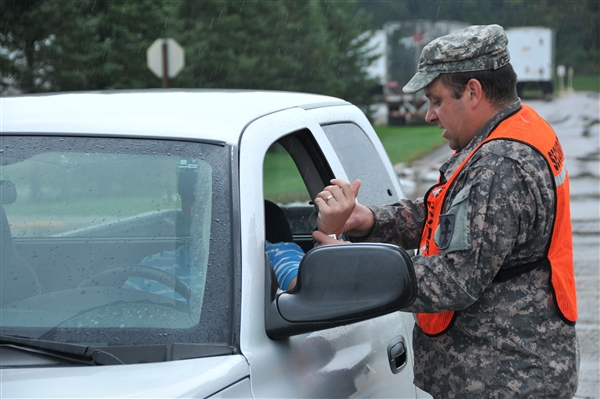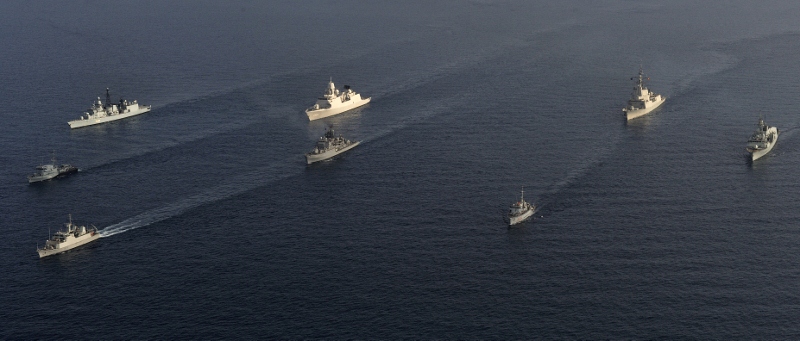STUTTGART, Germany, May 11, 2012 — Some staff members at U.S. European Command, the oldest and in some people’s view, most traditional of the U.S. combatant commands, thought the “whole-of-government” concept introduced about three years ago was nothing but a fad.
Mike Anderson, acting director of Eucom’s Interagency Partnering Directorate, said he knew differently from the start. The idea of promoting interagency collaboration that leverages all elements of national power to address challenges in Europe and Eurasia simply made too much sense to fade with the times, he said. Navy Adm. James G. Stavridis had already seen the benefits of interagency collaboration as commander of U.S. Southern Command when he arrived here three years ago to take the helm at Eucom. Because the Eucom staff interfaces with NATO and European militaries , Stavridis opted to assign a Napoleonic “J code” to the command’s new interagency partnership directorate to help synchronize it with the NATO structure and elevate its stature within his own command.
Southcom, U.S. Africa Command and U.S. Pacific Command have since adopted the same J9 model, Anderson noted. U.S. Northern Command, Centcom and U.S. Special Operations Command all also have standalone interagency directorates, although they do not designate them as “J9” staffs.
“It’s one thing organizationally to make a change, but the more important thing, in my humble opinion, is the cultural change,” Anderson said during an interview with American Forces Press Service. The cultural change didn’t come overnight at Eucom, he admitted, but thanks to the commander’s emphasis, visible contributions, and repeated reinforcement, it has taken hold.
“Two-and-a-half years into it, it is almost second nature,” Anderson said. “The mindset has changed.”
What’s accelerated that, he said, is more than simply command emphasis. The proof has been in the pudding, the value that comes from incorporating interagency partners directly into the staff.
Stavridis’ civilian deputy to the commander, Ambassador Larry Butler, brings a State Department perspective as he advises Stavridis regarding the command’s missions and activities.
In addition, the Interagency Partnering Directorate — a staff of about 30 military members, DOD civilians and agency partners from throughout the federal government — contributes specialized expertise throughout the command. The directorate hosts representatives from the departments of State, Justice, Energy and Treasury, the FBI, Immigration and Customs Enforcement, Customs and Border Protection, the Drug Enforcement Administration, U.S. Agency for International Development, Office of Foreign Disaster Assistance and the Justice Department’s International Criminal Investigative Training Assistance Program.
This sprinkling of “soft power” and law enforcement representatives throughout the command brings “vital depth and breadth to our command, its operations and our outreach across the continent,” Stavridis said. That, he said, contributes directly to the mission and increases Eucom’s effectiveness and ability to speak and act across various organizational cultures.
“There’s been a huge return on investment,” Anderson agreed. “This military headquarters of nearly 1,000 people has realized that the relatively small investment of 30 people in this directorate makes the plans they are working on and the exercises they are training on more realistic and better informed than when they previously were informed by just a single, Defense Department vantage point.”
Interagency partnering has become a foundation for applying “Smart Defense” at time when budgets may be shrinking, but threats aren’t, Stavridis recently told Congress.
Today’s complex security environment exceeds the capacity of any single government organization, the admiral told the Senate Armed Services Committee in March.
“It demands whole-of-government solutions that draw strength and effectiveness from the collective judgment, training and experience of the many public servants in government who, working together, can effectively synchronize the elements of national power,” Stavridis said.
And particularly in light of constrained resources, he said, there’s clear recognition of the benefits of bringing both “soft” and “hard” power to the table. “At European Command, we believe that ’no one of us is as smart as all of us, thinking and working together,’ ” Stavridis told the Senate panel.
The interagency partners’ contributions extend far beyond their representation on the Eucom staff, Anderson explained. Each has direct reach-back to other experts within their agencies, as well as working relationships with their counterparts in U.S. embassies in Europe and Eurasia. Besides hosting federal agency partners, the J9 directorate serves as the command’s lead for interacting with international and non-governmental organizations, the private sector, think tanks and academia.
The presence of other agency expertise at a military command has had a huge payoff at Eucom, enhancing the support it’s able to provide allied and partner nations. For example, Eastern European nations that come to Eucom for help in securing their borders — not a traditional U.S. military mission — can tap into expertise from other U.S. agencies that specialize in that function.
“Now, we have border-security experts right down the hallway,” Anderson said, including Customs and Border Protection, Immigration and Customs Enforcement and DEA. And when needed, they can call on their respective agency headquarters to dispatch “A teams” to advise and train partner nations.
“So when you talk about ‘bang for the buck,’ there’s been a realization on the staff here that by having this relatively small footprint of interagency partners, we have so much more reach-back to the rest of the ‘whole-of-government,’ ” Anderson said.
As the United States draws down its forces in Afghanistan and shifts it focus to preserving strategic partnerships with European allies, Anderson said the “strategic bridges” established throughout the U.S. interagency can’t be forgotten.
“We also don’t want to lose the strategic partnerships we have developed with our own federal partners,” he said. “They are strategic partners as well, and our strengthened relationships with them were also born of crisis, after 9/11. And they, too, will be critical to our country as we face the future.”
Source:
U.S. Department of Defense
Office of the Assistant Secretary of Defense (Public Affairs)

 von
von 

